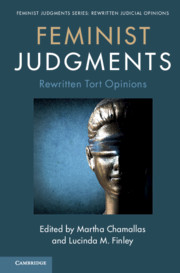Book contents
- feminist judgments: rewritten tort opinions
- Feminist Judgments Series Editors
- Feminist Judgments: Rewritten Tort Opinions
- Copyright page
- Contents
- Notes on Contributors
- Preface
- Table of Cases
- Part I Introduction
- Part II The Classics
- 2 Commentary on Palsgraf v. Long Island Railroad Co.
- 3 Commentary on Escola v. Coca-Cola Bottling Co. of Fresno
- 4 Commentary on Farwell v. Keaton
- 5 Commentary on Tarasoff v. Regents of University of California
- Part III Intentional Torts
- Part IV Negligence and Vicarious Liability
- Part V Damages
- Index
4 - Commentary on Farwell v. Keaton
from Part II - The Classics
Published online by Cambridge University Press: 28 November 2020
- feminist judgments: rewritten tort opinions
- Feminist Judgments Series Editors
- Feminist Judgments: Rewritten Tort Opinions
- Copyright page
- Contents
- Notes on Contributors
- Preface
- Table of Cases
- Part I Introduction
- Part II The Classics
- 2 Commentary on Palsgraf v. Long Island Railroad Co.
- 3 Commentary on Escola v. Coca-Cola Bottling Co. of Fresno
- 4 Commentary on Farwell v. Keaton
- 5 Commentary on Tarasoff v. Regents of University of California
- Part III Intentional Torts
- Part IV Negligence and Vicarious Liability
- Part V Damages
- Index
Summary
Farwell v. Keaton is the classic torts case that has introduced generations of law students to the “no-duty-to-rescue” rule which allows individuals to refrain from aiding persons in peril. The case is an exception, imposing a duty on a teenage boy who failed to come to the aid of his companion who died after being beaten by a group of boys. The court emphasized the relationship between the parties and the fact that the defendant had rendered some initial aid to his friend. The rewritten feminist opinion also imposes a duty but replaces the myriad common-law exceptions to the “no-duty-to-rescue” rule. Embracing a humanitarian approach based on the circumstantial connection between the parties in the case, the feminist judgment imposes liability whenever failure to do so would “shock the conscience,” placing US tort law on par with the law in many European nations. The accompanying commentary recharacterizes the case as one involving sexual harassment and stalking, focusing on the behavior of the defendant and his companion who set the chain of events in motion when they followed two teenaged girls who later complained to the assailants.
- Type
- Chapter
- Information
- Feminist Judgments: Rewritten Tort Opinions , pp. 73 - 92Publisher: Cambridge University PressPrint publication year: 2020

